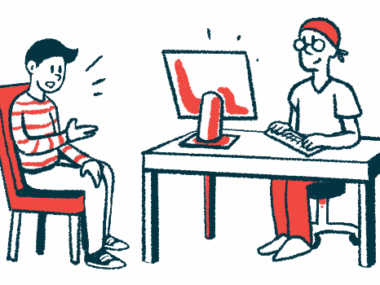Parents of Rett Syndrome Teenagers Face Difficult Choices for Their Girls
Written by |

Having a child with special needs means having additional worries, fears, and caregiving duties, especially during puberty. That’s a rough time for everyone, but when the child is nonverbal and nonambulatory, it’s much more complex.
Typically, parents teach their children personal care like showering at a young age, and then the children are independent with these tasks. Most parents aren’t bathing their teenager, brushing their hair and teeth, and changing them.
For instance, I can give my younger, neurotypical daughter a tutorial on personal care like shaving her legs, and she’s good to go from there on out. But for my teenager, Cammy, who has Rett syndrome and cannot control her body or use her hands, these life lessons become more complicated. Her grooming falls on me, or even more uncomfortably, her dad.
The thought of Cammy needing braces plagued me for a long time. Oral hygiene is tricky for those with Rett syndrome. Cammy is unable to brush her teeth or do whatever’s necessary to take care of the braces, and they might cause her pain. I was relieved when her dentist told me Cammy had no need for braces and thankful there was no reason to put her through that.
My 11-year-old, Ryan, had the awkward puberty presentation this spring in fifth grade. I’m able to answer any additional questions she has easily. But with Cammy, who is a nonverbal 13-year-old, I have no idea what her questions and concerns are about this hormonal time in her life. I have to speak with my daughters at the same time so Ryan’s questions can benefit them both.
This brings me to the topic no parents of special-needs children want to think about: periods. Some girls with Rett don’t get their periods because they’re way too thin. If they do get their period, the caretakers again handle all that is involved with that time of the month.
Parents have to make difficult decisions. Some parents of Rett girls choose to get hormonal treatments to stop their daughter’s periods. They choose this for their own reasons — to not have to worry about that personal care, or to avoid their girl’s cramps and discomfort during that time of the month. These are personal decisions that parents of neurotypical girls don’t have to think about.
The next topic parents of special-needs children talk about in support groups is birth control. Why would a girl in a wheelchair, unable to use her hands and control her limbs, be on birth control? There is a realistic fear that parents of a special-needs child have — that their daughter will be taken advantage of. My child is unable to stop a situation or tell me if someone has hurt her in any way.
These decisions don’t require anyone else’s opinion. Every family is different and makes decisions based on what is right for their children and family. These are just some topics that most people don’t consider when they see all the other layers we deal with daily.
Note: Rett Syndrome News is strictly a news and information website about the disease. It does not provide medical advice, diagnosis, or treatment. This content is not intended to be a substitute for professional medical advice, diagnosis, or treatment. Always seek the advice of your physician or other qualified health provider with any questions you may have regarding a medical condition. Never disregard professional medical advice or delay in seeking it because of something you have read on this website. The opinions expressed in this column are not those of Rett Syndrome News or its parent company, Bionews, and are intended to spark discussion about issues pertaining to Rett syndrome.







mali newman
Hello, thanks for your help.
we need to change the policy at children's hospitals for our girls 21 and up they conceder them adult and they do not want them even when they got all there medical treatment at children's.
our girls stay pediatric no matter what age they are and they need to continue to see there specialist doctors at children's . in adult hospital they do not know what to do with them my daughters almost died there and with so much phone calls we were able to transfer her to icu at children's where the doctor did not understand why she could not come there in the first place.
please if you can advocate for the girl that are 21 and up it will be help full . i contact a congress man waiting for a respond. please help ???